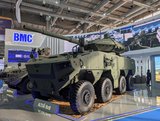Bahrain requests Patriot missile systems
The US State Department has made a determination approving a potential foreign military sale of Patriot missile systems to Bahrain, the Defense Security Cooperation Agency announced on 3 May.
In a package worth $2.48 billion, Bahrain has requested 60 Patriot Advanced Capability-3 (PAC-3) Missile Segment Enhancement (MSE) missiles, 36 Patriot MIM-104E guidance enhanced missiles with canisters, nine M903 launching stations, five antenna mast groups, three electrical power plants III, two AN/MPQ-65 radar sets, and two AN/MSQ-132 engagement control stations.
Also included are communications equipment, systems integration and checkout and other related elements of logistics and programme support.
Bahrain will use Patriot to improve its missile defence capability, defend its territorial integrity and deter regional threats.
If the sale goes ahead, Lockheed-Martin will be the prime contractor for PAC-3 missile and Raytheon will be the prime contractor for GEM-T missile.
Related Equipment in Defence Insight
More from Land Warfare
-
![World Defense Show 2026: Large vehicles and counter-drone systems take the limelight]()
World Defense Show 2026: Large vehicles and counter-drone systems take the limelight
Visitors who attended the first World Defense Show four years ago continue to speak of the difficulties they faced with poor facilities and power problems. This year’s event emphasised its status as one of the major defence expositions and as a place where regional players and those less welcome at other shows could take centre stage.
-
![Active vehicle protection comes to the forefront as Trophy and Iron Fist secure contracts]()
Active vehicle protection comes to the forefront as Trophy and Iron Fist secure contracts
Experience on the battlefield is accelerating the adoption of active protection systems as technologies continue to evolve to reflect shifting global defence needs.
-
![World Defense Show 2026: Hanwha increases Middle East presence and reveals Tigon 6x6 sale]()
World Defense Show 2026: Hanwha increases Middle East presence and reveals Tigon 6x6 sale
Shephard sat down with Hanwha Middle East and Africa president Sung Il at World Defense Show 2026 to hear about the company’s plans for the region and how it plans to use local industry success to win deals.























